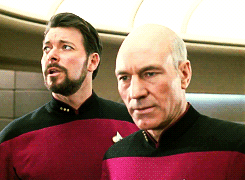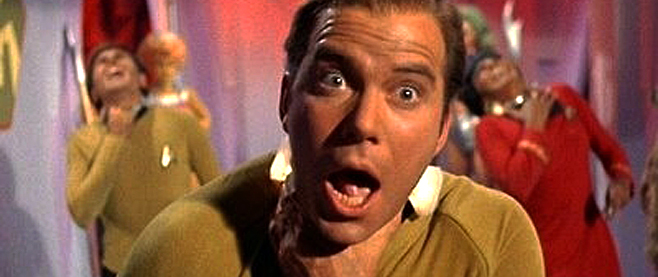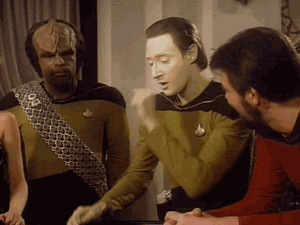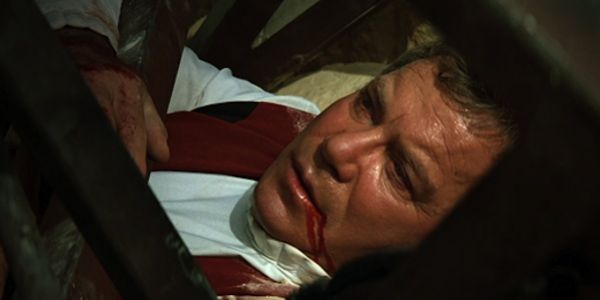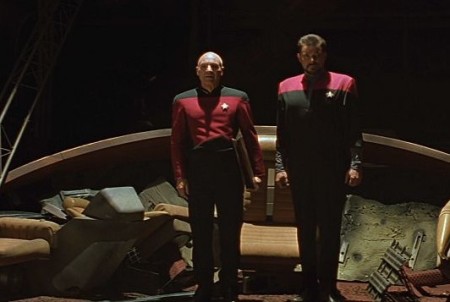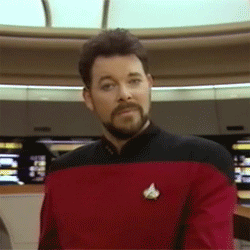This week I take on the haters of Star Trek: Generations, the very first cinematic adventure of the Enterprise-D and the “Next Generation” crew. I’ve already strapped on the gloves to defend Green Lantern and Constantine, and now it’s time to do my Starfleet duty and ask the question: Why you gotta be so rude? About, you know, Jean-Luc Picard.
Star Trek: Generations
Star Trek: Generations hit theaters in November of 1994, just six months after the series finale “All Good Things” had aired. That’s a shockingly small window of time, the kind of synergy between television and movies you almost never see. Cries to make a beloved TV show into a movie almost always fall upon deaf-ass ears, and even the ones that do get made (X Files, Serenity) come years after the TV show ended, sheepishly, hoping you haven’t completely forgotten about them.
No such hand-in-hat begging for Star Trek fans. Just as the series ended, BOOM, here comes the judge. And in this particular instance, the judge is Captain James T. Mother Fuckin’ Kirk.
Anywho, Star Trek: Generations stars the cast of TNG alongside William Shatner, the OG Enterprise captain (sorry Scott Bakula). Other than some space/time jaunts, it tells a relatively straightforward story about Captain Picard and his crew taking on Soren, an alien scientist with a tragic backstory who is willing to sacrifice millions of lives for his own obsession with immortality and unreachable happiness. It also deals with Picard’s fear for his own legacy and fan-favorite Data’s quest for humanity hitting a sudden emotional snag. It also attempted to pass the torch between Kirk and Picard, in a way that many people found unsatisfying.
Rotten Tomatoes Score: 48%
Equal or Greater Score: Rio 2
The scene where Kirk and Picard meet is better than Rio 1, Rio 2, and Snowpiercer combined. I’m kidding. Rio 1 was awesome. Okay, I’m kidding about that too. Also I liked Snowpiercer, I just think it’s overrated. Please don’t kill me I love you, you sexy person you.
The Complaints
This part of the article has been the hardest for me to nail down, if you don’t mind me lifting the curtain right now to reveal an old, shriveled shyster pretending to be a wizard. I scoured old reviews of the movie, but I couldn’t find any particular through-line of dislike. While it’s clear that most people don’t like the movie, the reasons shift like the shifting sands of a shifty desert.
There are complaints of “boring,” which I guess might retain some validity if you came to Generations looking for an action movie. It isn’t one, and it makes no real attempt to become one. Some say that it’s only a “big budget version of a TV episode,” which is sort of dull and unpainful as insults go. Calling a movie an expensive version of one of the best shows on TV doesn’t really have any teeth that can chomp. There are a few, more common complaints that run through multiple reviews. Some people thought the climax was weak, as it mostly consisted of a three-way fight between three old men, two of whom are European scientists. They go further, mentioning that it’s also a literal rehash of an earlier scene, a “do-over” with only Kirk added to the mix.
The most giant complaint is the one that people seem to hang their angry hats on – the (20-year-old spoiler alert) ignominious death of Captain James T. Kirk. He doesn’t kick it saving the universe, he doesn’t leap onto the sacrificial altar, hell he doesn’t even kill the bad guy. It’s just “ooops, the bridge broke,” and Kirk falls to his death with no one around to see it. An ignoble end for the swashbuckling captain who started it all.
Why They’re Wrong
First off, they’re wrong because Star Trek: Generations tells a good story. It’s not a pleasant story, and it’s not the big heroic explosion of awesome people might have wanted, but it’s unabashedly itself. What I mean by that is this: The screenwriters (Braga, Berman, and Moore) came up with a story about change and demise, and how we as mortals can’t seem to fit our own relatively pointless deaths into our personal narratives.
Thematically, Generations is completely consistent and nearly perfect. Again, perfect thematically. Let’s start at the beginning, shall we?
The movie opens with the christening of the Enterprise-B, an Excelsior-class ship captained by Cameron from Ferris Bueller’s Day Off. It’s the first ship dubbed “Enterprise” in 30 years to not have Kirk in the chair – well, the movie says this, but Spock actually spent some time as captain when Kirk became an admiral. Whatever, nerd alert. Anyway, Starfleet puts Kirk, Chekov, and Scottie on the ship for its maiden voyage, a deft PR move meant to “pass the torch.” However, it turns out Captain Cameron is (surprise) a bad captain, or at least, he’s unprepared for shit to go down. Which it does. Starfleet’s obsession with “passing the torch” actually ends up screwing them, because they were more focused on their legacy then on installing torpedoes or a tractor beam in time for the ship’s shakedown cruise. Remember that, for later.
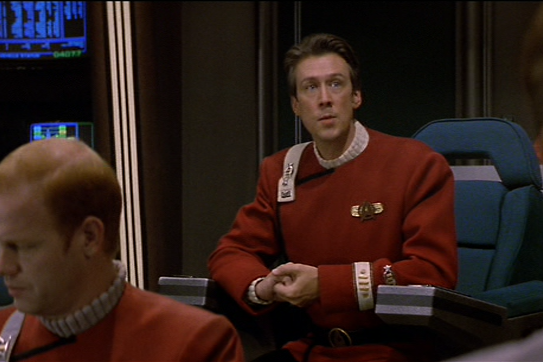
Kirk has to spring into action to save some colonists caught in an Energy Death Spooky Thing, and though he saves the Enterprise and many of the colonists, oops, he dies. Sucked into space. Chekov and Scottie and Cameron are very sad, and then the movie proper begins.
The flick jumps to the TNG crew, and has them embroiled in the main plot with Soren, a long-lived Illorian who is obsessed with time and his own mortality. Early on, Picard learns that his uncle, his sister-in-law, and their son (his godson) burned to death in their home on Earth, which means Jean Luc Picard is now the last of the noble Picard line. He’s also pushing seventy and has no children. As you can imagine, this is a huge existential moment for him, and he spends the rest of the running time grappling with the way he chose to live his life now that pointless oblivion seems to be staring him in the face.
There’s an excellent sub-plot with the android Data finally deciding to install an emotion chip (which he ganked from his evil brother Lore a few years back, nerd alert number 2 I’m sorry okay). Anyway, Data is inundated with the full, tidal-force juice of human emotions, and it turns out having the feels isn’t all laughs and orgasms.
Data’s crippling fear gets his friend kidnapped and tortured, and his anger . . . well, this is where the movie definitely gets shaky. They set up a brilliant plot about Data realizing how hard it is to be human and reconsidering his series-long ambition to become one, and then they completely abandon it. Data is barely in the last third of the movie, and doesn’t do much more than say “shit” as the Enterprise is destroyed. There’s a brief moment in the epilogue where Data tells Troi that he’s at peace with his new emotions, but it’s completely unearned and an obvious sign that they couldn’t fit the climax or resolution of his subplot into the story structure.
Anyway, the main story soldiers on well, keeping a pretty tight rein on its themes. Picard (the hero) and Soren (the villain) are both now deeply upset about their encroaching mortality, and it’s a nice duality. Once Picard and Soren both enter the “Nexus,” which is essentially happy-time fairy heaven, we get to see that Picard’s fears are unwarranted. He sees himself with a family, and though it’s clear he enjoys the idea, he’s left ultimately unsatisfied. Picard realizes that his legacy is his actions, not his progeny. He knows he’ll die someday, just as pointlessly as his family, no doubt, but that’s something he can live with. Still, he grabs Kirk (who also got sucked into the Nexus in the beginning) to go save the world, but Kirk’s having a similar crisis of fantasy.
Kirk is already dead (really in the Nexus), and he’s looking wistfully back at a time that didn’t exist. The times before his failing marriage failed, when he should be happy. The little moments of joy, but somehow they all turn to ash. He makes the same realization as Picard – his life isn’t defined by his death, or by the actions he never took. He’s James T. Kirk – legacy is not a problem. He chose the path he chose, and his ultimate death doesn’t have to change his life.
Many people don’t like how easily the Enterprise-D is destroyed by a tiny Klingon warship in the 2nd act climax, but they’re missing the point. I mean, logically, the Enterprise got caught with its pants down, and the Klingons had obtained the ship’s shield codes from the tortured and camera-implanted Geordi LaForge. However, it’s just another spike on the theme graph – the Enterprise is destroyed because all things end. Hell, the finale of the show was called “All Good Things,” the first half of the saying “All Good Things Must Come to An End.”
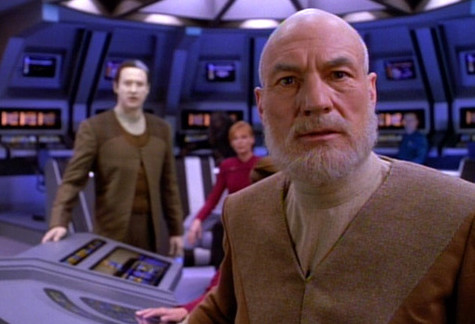
The most famous building in the world will crumble to the ground someday. The best literary masterpiece will be forgotten. Peter Stormare’s awesome performance as Lucifer will one day disappear to the ravages of time. “Time is a predator,” Soren says in the movie. “It’s stalking you.” He later goes on to say that “time is the fire in which we burn. Right now, Captain, my time is running out. We leave so many things unfinished in our lives. I know you understand.”
That’s pretty much Malcolm McDowell laying out the theme on an evil silver platter, but there it is. All things end, all joy ceases, all hearts stop beating. All Enterprises crash, for instance. However, what Soren misses, and what Picard and Kirk discover, is this: your end doesn’t matter. It’s okay if your death is pointless, because all deaths are pointless. Luckily, however, death doesn’t have to be your only story. Let your life, your works, and the people you leave behind define you. A death is one moment in a lifetime of millions of moments, and it holds no more weight than the most banal moment in your life (mopping the floor, waiting in line at the DMV, etc).
Kirk dies alone, because we all die alone. He doesn’t save the galaxy, sure, but he damn sure saves millions of lives, including the entire crew of the Enterprise-D. The movie begins with Kirk giving his life for the Enterprise, and it ends with Kirk giving his life for the Enterprise. As thematic bookends go, well, shit, son.
Picard witnesses Kirk’s final words, which don’t amount to much, but yet somehow are more Kirk and more human for being relatively, again, pointless.
Kirk: “Did we do it? Did we make a difference?”
Picard: “Oh yes, we made a difference. Thank you.”
Kirk: “Least I could do . . . for the captain of the Enterprise. It was . . . fun. Oh my.”
Fuck you, take my feels. He doesn’t babble on like Trinity, he doesn’t try to shout something for the ages. He just dies, like a real person, smirking, afraid, confused, and oddly satisfied. It’s beautiful, and it’s probably Shatner’s best work.
Soren dies in an explosion. He isn’t shot by Picard or punched to death by Kirk. He doesn’t make it to the Nexus, and his entire long life has been spent pointlessly. Not because his death was ignoble, but because his obsession with death made his entire life ignoble.
Later, as Picard and Riker sift through the destroyed remnants of the Enterprise, Picard is strangely upbeat. Not happy, definitely wistful, but there’s no gut-wrenching sense of loss in his eyes. His dialogue says it better than I could:
Riker: “I’m going to miss this ship; she went before her time.”
Picard: “Someone once told me that time was a predator that stalked us all our lives. But I rather believe that time is a companion who goes with us on the journey, and reminds us to cherish every moment . . . because they’ll never come again. What we leave behind is not as important how we lived. After all, Number One, we’re only mortal.”
Then Riker makes a joke about being immortal, because he’s a dick (and he is immortal), but Patrick Stewart really fucking delivers the lesson in the way only Patrick Stewart can. Pay close attention to the way he says “because they’ll never come again.” It’s beautiful and sad and hopeful and perfect. I learned more about life and death in this dumb movie than most books, sermons, or life-events have taught me.
In Conclusion
The theme of Star Trek: Generations isn’t “passing the torch” – it’s “not giving a shit about who is holding the torch.” That’s the point of the movie, the point most people miss completely in trying to fit it into the ill-suited pigeonhole they wanted it to slot into.
Picard said it best, and I paraphrase: “Just be awesome, jackass. That’s eternal life. Everything else is just cold comfort. Picard out, bitches.”
And in that, the movie achieves exactly what it set out to do, which makes it a good-ass movie. Give it a rewatch, for me. For the polar bears. For science.


